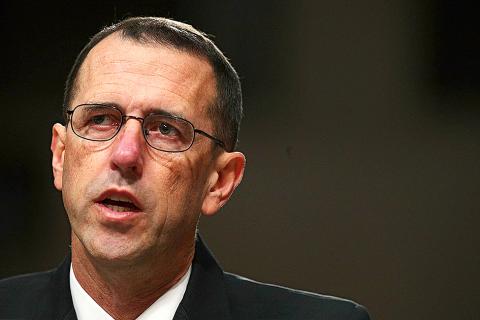A top US Navy admiral has announced the re-establishment of the US 2nd Fleet — a Cold War command disbanded in 2011 — to patrol the North Atlantic and face a resurgent threat from Russia.
The chief of US Naval Operations, Admiral John Richardson, made the announcement during a change of command ceremony on Friday in the naval port of Norfolk, Virginia.
“Our National Defense Strategy makes clear that we’re back in an era of great power competition as the security environment continues to grow more challenging and complex,” Richardson said, according to a US Navy statement. “That’s why today, we’re standing up Second Fleet to address these changes, particularly in the north Atlantic.”

Photo: AFP
The 2nd Fleet command was disbanded as a cost-savings step in 2011, and its assets and personnel dispersed within the navy.
The new command will be responsible for US naval forces along the US east coast as well as the north Atlantic region, a statement said.
Before it was disbanded the 2nd Fleet played a key role during the Cold War years, with operations in the North Atlantic and supporting US naval forces in the Mediterranean.
Russian planes and ships have in recent months made multiple incursions in the north Atlantic close to the airspace and territorial waters of US NATO allies, including Britain.
NATO naval officials late last year also reported Russian submarines probing undersea data cables in the north Atlantic.
The 2nd Fleet command currently exists only on paper, but according to USNI News, a publication of the US Naval Institute, the command is scheduled to open for business on July 1 with 11 officers and four enlisted personnel.
The command will eventually grow to 256 personnel — 85 officers, 164 enlisted and seven civilians — USNI reported, citing a memo signed earlier in the week by US Secretary of the Navy Richard Spencer.
The decision to reactivate the 2nd Fleet followed increasing threats in the Atlantic from Russia, officials familiar with the decision told USNI News.
US Secretary of Defense James Mattis in January said the US is facing “growing threats” from China and Russia, and warned that the US military’s advantages have eroded in recent years.
“We face growing threats from revisionist powers as different as China and Russia, nations that seek to create a world consistent with their authoritarian models,” Mattis said as he unveiled the Pentagon’s latest National Defense Strategy.
“Our military is still strong, yet our competitive edge has eroded in every domain of warfare,” he added.

AGING: As of last month, people aged 65 or older accounted for 20.06 percent of the total population and the number of couples who got married fell by 18,685 from 2024 Taiwan has surpassed South Korea as the country least willing to have children, with an annual crude birthrate of 4.62 per 1,000 people, Ministry of the Interior data showed yesterday. The nation was previously ranked the second-lowest country in terms of total fertility rate, or the average number of children a woman has in her lifetime. However, South Korea’s fertility rate began to recover from 2023, with total fertility rate rising from 0.72 and estimated to reach 0.82 to 0.85 by last year, and the crude birthrate projected at 6.7 per 1,000 people. Japan’s crude birthrate was projected to fall below six,

Conflict with Taiwan could leave China with “massive economic disruption, catastrophic military losses, significant social unrest, and devastating sanctions,” a US think tank said in a report released on Monday. The German Marshall Fund released a report titled If China Attacks Taiwan: The Consequences for China of “Minor Conflict” and “Major War” Scenarios. The report details the “massive” economic, military, social and international costs to China in the event of a minor conflict or major war with Taiwan, estimating that the Chinese People’s Liberation Army (PLA) could sustain losses of more than half of its active-duty ground forces, including 100,000 troops. Understanding Chinese

US President Donald Trump in an interview with the New York Times published on Thursday said that “it’s up to” Chinese President Xi Jinping (習近平) what China does on Taiwan, but that he would be “very unhappy” with a change in the “status quo.” “He [Xi] considers it to be a part of China, and that’s up to him what he’s going to be doing, but I’ve expressed to him that I would be very unhappy if he did that, and I don’t think he’ll do that. I hope he doesn’t do that,” Trump said. Trump made the comments in the context

SELF-DEFENSE: Tokyo has accelerated its spending goal and its defense minister said the nation needs to discuss whether it should develop nuclear-powered submarines China is ramping up objections to what it sees as Japan’s desire to acquire nuclear weapons, despite Tokyo’s longstanding renunciation of such arms, deepening another fissure in the two neighbors’ increasingly tense ties. In what appears to be a concerted effort, China’s foreign and defense ministries issued statements on Thursday condemning alleged remilitarism efforts by Tokyo. The remarks came as two of the country’s top think tanks jointly issued a 29-page report framing actions by “right-wing forces” in Japan as posing a “serious threat” to world peace. While that report did not define “right-wing forces,” the Chinese Ministry of Foreign Affairs was